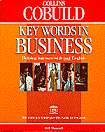

| Book of the Month | ||
 | Key words in Business |  |
Publisher: Collins Cobuild
Author: Bill Mascull
206 pages
Price £9.40
ISBN 0 00 375045 0
This month we put on our suits, pick up our briefcases and look at a book from the world of Business. We know from your questions to the Prof, and all our vistors to the business exercises on English for Everybody that there's a lot of you business students out there. So this month's review is for you.
This book is part of a series by Bill Macull, who has also written Key Words in the Media, and Key Words in Science and Technology. Key words in Business covers almost all types of business, though if you are looking for secretarial English, you would do better to save your money and wait for the third series of the English for Everybody business exercises (secretarial).
The book has six units. Each unit looks at business in a different way. The first chapter asks 'What business are you in?'. The second chapter is about People and Organizations, and the third covers Ressearch, Development and Production. The other three chapters are Products, Markets and Marketing, The Bottom Line (profits and accountancy) and the Feelgood Factor (about stock markets). Each section has smaller divisions, so (for example) People and Organizations has sections on Managers, Hiring and Firing, and Human Resources.
The book has articles from newspapers and magazines, so you are reading 'real' English. Near each of the reading exercises, there is a grey box which has the key words for understanding the article. (Though don't expect definitions of all the words you don't understand!). There are also a lot of cartoons. There are exercises to check that you have understood the material and more general vocabulary exercises. The exercises are good, but don't seem very well organized. At the end of the unit there is a crossword to test what you have learned.
There is no grammar in the book, but some exercises have a language note, which explains any difficult grammar in the reading exercises. All exercises have an answer key at the back, and there is an index of all the vocabulary used. Colloquial language in the articles is not explained very well, and the book does not always explain why some words are the correct ones to use in particular situations. This suggests that this book is meant to be used in a class, or at least with a teacher's help. In the introduction the author says the book can be used by people studying by themselves, but they must have a high level of English. In fact, we would recommend that if your English is not advanced, then you should not self- study from this book.
If you are good at English and have some understanding of business, you will find this a very good way to understand some of the language used in business magazines and news reports. This book will also be very useful if you are a student in a business class, or studying business at college. However, if you are at the intermediate level or lower, and you are not very interested in getting a good business vocabulary, this book is not for you.
In English, when something is called "a parson's egg" it means that some parts are good, but not all. For us,l this book a parson's egg. We would like more structure in the exercises, so that students have a better idea of what they are learning. There is no real pattern to the book. This means that you can pick it up and start reading at any place, and still learn something interesting, but it does not feel very organized. On the other hand, the reading exercises are very good, and full of exactly the vocabulary you will need for business, and the cartoons are not just funny - you can also learn from them.
Verdict - Not everyone will like this book. You need to be a serious business student to want it, and even then you will need good English, and perhaps a teacher. As any businessman will tell you - check the competition before you buy.
Assessment 6/10